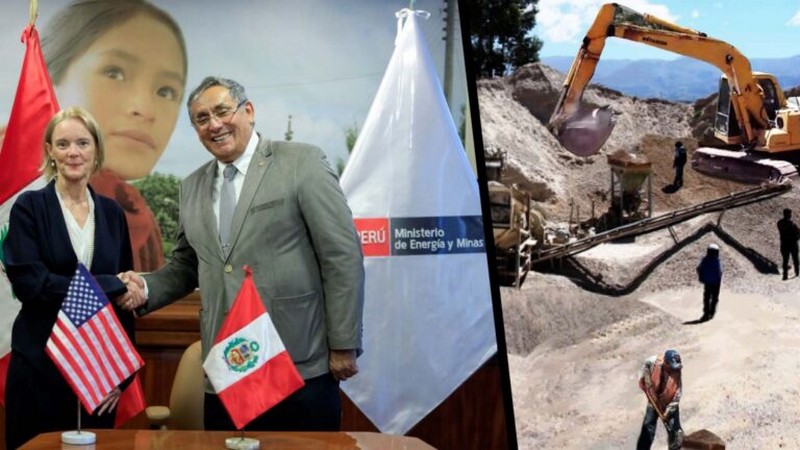By Ben Norton
Peru has large reserves of copper, gold, zinc, silver, lead, iron, and natural gas. After a coup overthrew left-wing President Pedro Castillo on 7 Dec 2022, the US ambassador, CIA veteran Lisa Kenna, met with mining and energy ministers to discuss “investments”. Europe is importing Peruvian LNG to replace Russian energy.
20 Jan 2023 – The US ambassador in Peru, Lisa Kenna, is a CIA veteran who supported a parliamentary coup in December 2022 that overthrew the South American nation’s democratically elected left-wing president, Pedro Castillo.
Castillo was subsequently imprisoned for 18 months without due process, setting off massive protests across Peru. The unelected government responded with extreme violence, killing approximately 50 protesters in just over a month.
One day before the December 7 coup, the former CIA officer turned US ambassador met with Peru’s defense minister, who then told the country’s powerful military to turn against President Castillo.
Peru resource battle: CIA-linked US ambassador talks ‘investments’ with mining/energy ministers
Since then, Kenna has been quite busy, regularly meeting with top officials in Peru’s coup government, including unelected President Dina Boluarte and her ministers.
On January 18, the US ambassador sat down with Peru’s minister of energy and mining, as well as its vice minister of hydrocarbons and vice minister of mining.
Peru’s Ministry of Energy and Mines boasted that they discussed “investment” opportunities and plans to “develop” and “expand” the extractive industries.
Peru is a country rich in natural resources, especially minerals. Spanish colonialists exploited the South American nation’s substantial silver and gold reserves, and today transnational corporations see it as a very profitable resource hub.
One of Earth’s top producers of copper, lead, zinc, tin, silver, and gold, Peru’s economy relies heavily on the mining sector, which represents more than half of total national exports and over 10% of GDP.
The world’s three largest transnational mining corporations – BHP, Rio Tinto, and Glencore – are heavily invested in Peru, along with other prominent companies from Canada, Brazil, Switzerland, Britain, the US, Japan, and Australia.
Peru is the planet’s second-biggest copper producer (after its neighbor Chile), meaning it will become increasingly important in the global shift toward renewable energy technologies.
US investment banking giant Goldman Sachs stated in 2022 that “copper is the new oil”, writing: “The critical role copper will play in achieving the Paris climate goals cannot be overstated… As the most cost-effective conductive material, copper sits at the heart of capturing, storing and transporting these new sources of energy”.
Peru is also a significant producer of liquified natural gas (LNG). Its LNG exports are largely overseen by foreign corporations like Shell.
Europe became the top importer of Peruvian LNG in 2022, after the European Union boycotted Russian energy over the proxy war in Ukraine.
While natural resources are not the only reason for these coups in Latin America, they are a significant factor.
Following the violent putsch in Peru’s mineral-rich neighbor Bolivia in 2019, a critic wrote to billionaire Elon Musk on Twitter, “You know what wasn’t in the best interest of people? The US government organizing a coup against Evo Morales in Bolivia so you could obtain the lithium there”.
Musk replied, “We will coup whoever we want! Deal with it”.
Peru’s President Castillo: ‘We want our natural resources to directly benefit the people’
When he ran for office in 2021, left-wing presidential candidate Pedro Castillo had made one of the central themes of his campaign the need to reassert popular control over Peru’s natural resources.
Condemning foreign companies for “pillaging” the country, he called to renegotiate contracts to ensure that 70% of all proceeds from mining went to the state, to fund social programs.
A few weeks before the presidential elections, Castillo said, “Let’s be clear: these decades of betrayal, corruption, and cynicism are the symptoms of this neoliberal system dedicated exclusively to the exploitation of our people and natural resources for the benefit of a few scoundrels”.
When he entered office, Castillo was very limited in what he could do politically. The right-wing opposition had a majority in the congress, and they were hellbent on destabilizing and eventually removing him with a presidential “vacancy”. They used Peru’s legislature and the heavily politicized and corrupt judiciary to launch constant attacks against Castillo, as part of a campaign of systematic persecution and lawfare.
But Castillo did what he could. The president announced a “second agrarian reform” and declared, “We are rescuing the resources of the country for all Peruvians”. He explained his goal: “We want our natural resources to directly benefit the people“.
Castillo’s government made plans with left-wing President Gustavo Petro in neighboring Colombia to develop gas infrastructure in Peru and expand internal use.
This was part of Castillo’s progressive economic model of import substitution industrialization, which aimed to grow local industry and boost domestic consumption, so Peru would not rely exclusively on low value-added exports.
Immediately after ousting Castillo, however, Peru’s coup regime returned to the neoliberal economic model of the Washington Consensus, prioritizing foreign corporate investment over internal development.
The Ministry of Energy and Mines tweeted on January 18 that it had just conducted a “high-level institutional dialogue between Peru and the United States, which addressed themes of development of the mining sector”.
US Ambassador Kenna met with Peru’s minister of energy and mining, Óscar Vera Gargurevich; vice minister of hydrocarbons, Enrique Bisetti Solari; and vice minister of mining, Jaime Chávez Riva.
The ministry said they discussed “themes linked to the expansion of natural gas, mining investments, and the development of renewable energies in our country”.
It added that “Minister Vera was grateful for the support from the North American government in mining-energy issues, and he reiterated the will of the national government, whose priority is the expansion of natural gas, energy security, and the petrochemical development of the south of the country”.
Mining dominates Peru’s economy
Benjamin Norton is an investigative journalist, analyst, writer and filmmaker.
23 January 2023
Source: transcend.org

